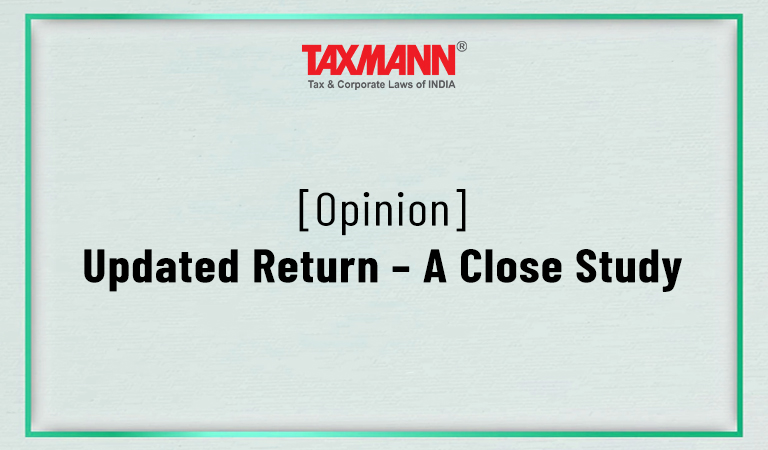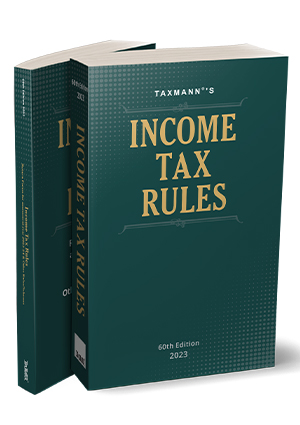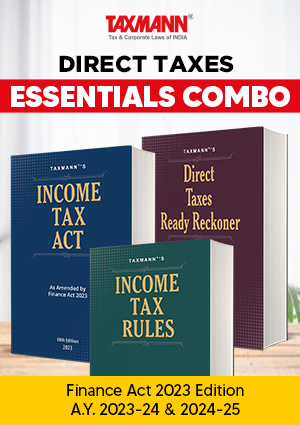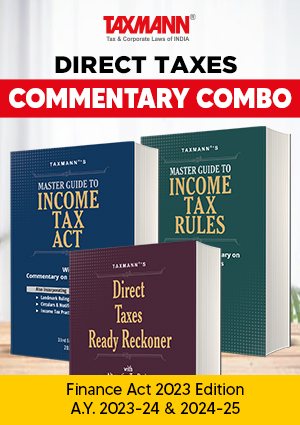[Opinion] Updated Return – A Close Study
- Blog|News|Income Tax|
- 2 Min Read
- By Taxmann
- |
- Last Updated on 17 November, 2022

V. K. Subramani – [2022] 144 taxmann.com 217 (Article)
The time limit for filing the ITR is given in section 139(1) which also contains list of persons who have to file ITR mandatorily based on certain specified criteria. Section 139(3) mandates filing of loss return in order to be eligible for carry forward of such loss to subsequent assessment years for set off. Section 139(4) provides the outer time limit for filing ITR and section 139(5) is meant for filing revised ITR where the assessee discovers any omission or any wrong statement therein. Section 139(4) previously permitted filing of ITR up to the end of the relevant assessment year. The Finance Act, 2021 however has curtailed the time limit by prescribing “three months prior to end of the relevant assessment year”. Thus, for the assessment year 2022-23, the ITR has to be filed under section 139(4) or section 139(5), before 31st day of December, 2022.
In this background, the legislature perhaps to tone down the rigour of the legal provision introduced the concept of ‘updated return’ by inserting sections 139(8A), 140B and 153(1A). This refresher takes note of the legal provisions newly brought in and with some simple examples how the tax liability is not as perceived prima facie when the legal provisions were announced vide the Finance Bill, 2022.
Updated return – section 139(8A)
Any taxpayer whether filed a return of income under section 139(1) or section 139(4) or section 139(5) or who has omitted to file his ITR for an assessment year may opt to file an updated return. The prescribed form for filing the updated return is ITR-U. The time limit for filing an updated return in ITR U is 24 months from the end of the relevant assessment year. Section 139(8A) was inserted by the Finance Act, 2022 w.e.f. 01.04.2022 which means updated return can be filed up to 31.03.2023 both for the assessment year 2020-21 and assessment year 2021-22 with differential tax liability.
Going further since the time limit for filing the return under section 139(4) or section 139(5) for the assessment year 2022-23 would expire on 31.12.2022, one may be tempted to file updated return for the assessment year 2022-23 immediately after 31st December, 2022. As the outer time limit for filing updated return is prescribed and there is no embargo in filing such return immediately after the lapse of time under section 139(4) / 139(5). Thus, the updated return would be operative for the assessment year 2020-21 to 2022-23 (3 assessment years) for a limited period up to 31.03.2023. However, such possibility is practically viable only if the schema for filing the same is enabled immediately after 31st December of each assessment year, commencing from 31st December, 2022.
| Time limit for filing updated return | A.Y.2022-23 | A.Y.2021-22 | A.Y.2020-21 |
| Up to 12 months from the end of the relevant assessment year with additional tax of 25% | From 01.01.2023 to 31.03.2024 | Up to 31.03.2023 | — |
| Up to 24 months from the end of the relevant assessment year with additional tax of 50% | Up to 31.03.2025 | Up to 31.03.2024 | Up to 31.03.2023 |
Click Here To Read The Full Article
Disclaimer: The content/information published on the website is only for general information of the user and shall not be construed as legal advice. While the Taxmann has exercised reasonable efforts to ensure the veracity of information/content published, Taxmann shall be under no liability in any manner whatsoever for incorrect information, if any.

Taxmann Publications has a dedicated in-house Research & Editorial Team. This team consists of a team of Chartered Accountants, Company Secretaries, and Lawyers. This team works under the guidance and supervision of editor-in-chief Mr Rakesh Bhargava.
The Research and Editorial Team is responsible for developing reliable and accurate content for the readers. The team follows the six-sigma approach to achieve the benchmark of zero error in its publications and research platforms. The team ensures that the following publication guidelines are thoroughly followed while developing the content:
- The statutory material is obtained only from the authorized and reliable sources
- All the latest developments in the judicial and legislative fields are covered
- Prepare the analytical write-ups on current, controversial, and important issues to help the readers to understand the concept and its implications
- Every content published by Taxmann is complete, accurate and lucid
- All evidence-based statements are supported with proper reference to Section, Circular No., Notification No. or citations
- The golden rules of grammar, style and consistency are thoroughly followed
- Font and size that’s easy to read and remain consistent across all imprint and digital publications are applied




